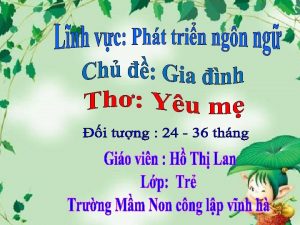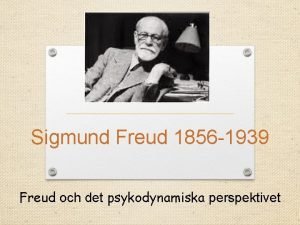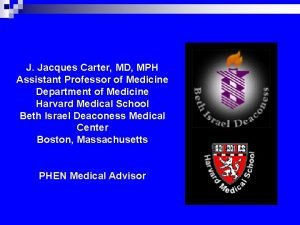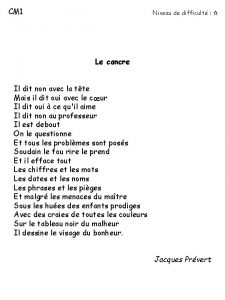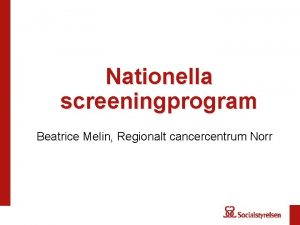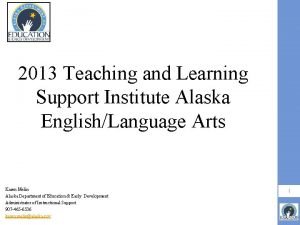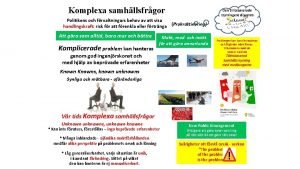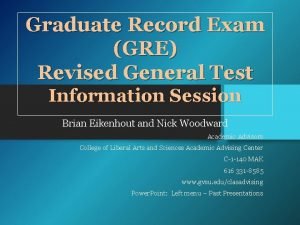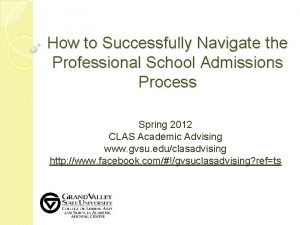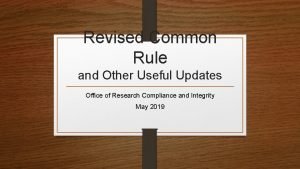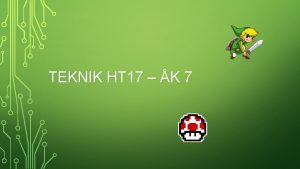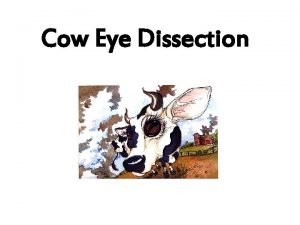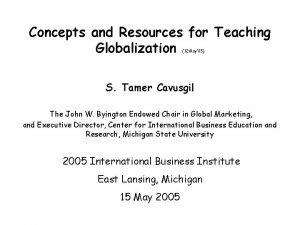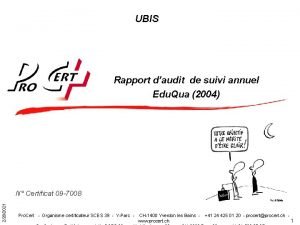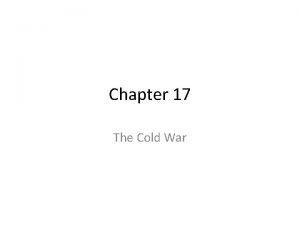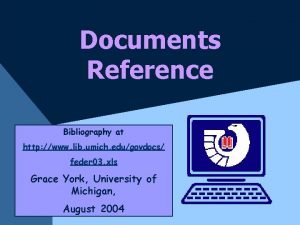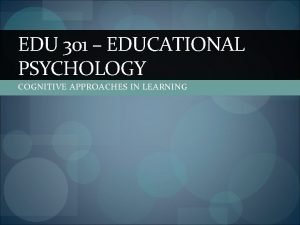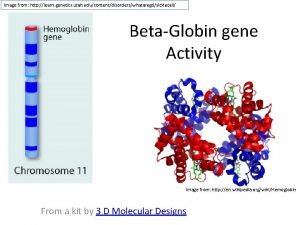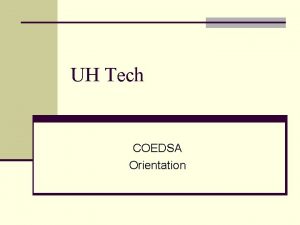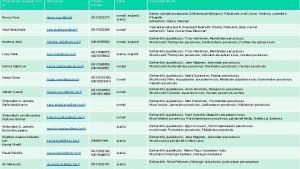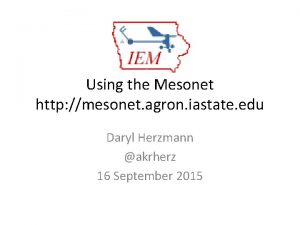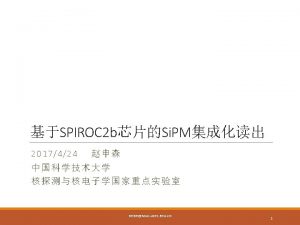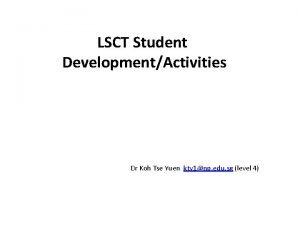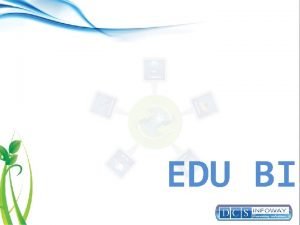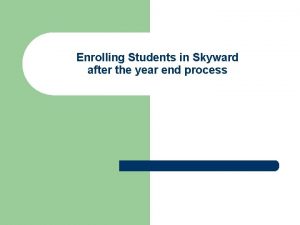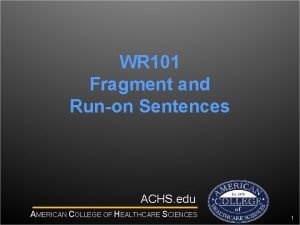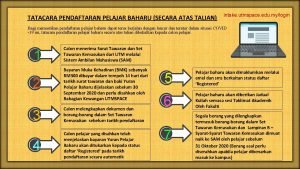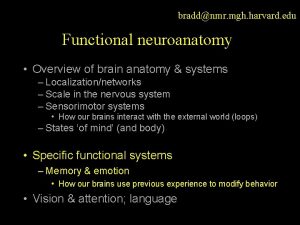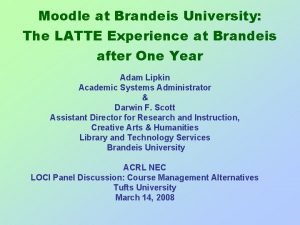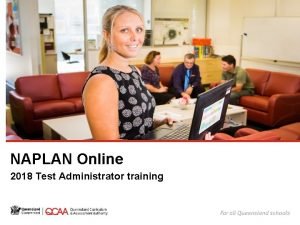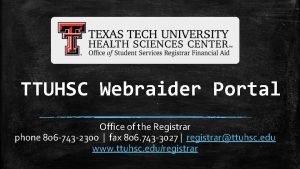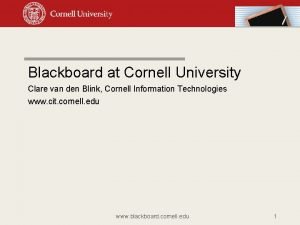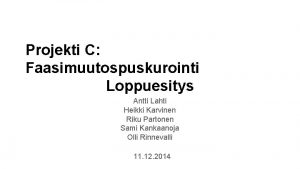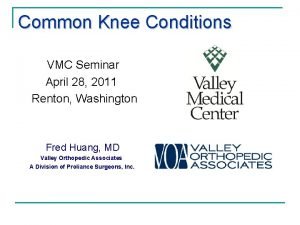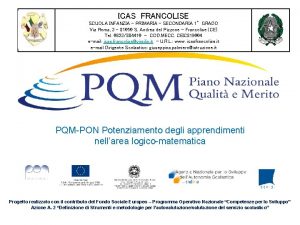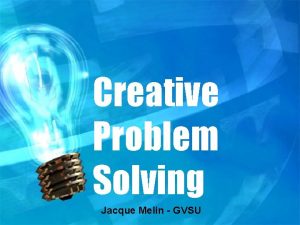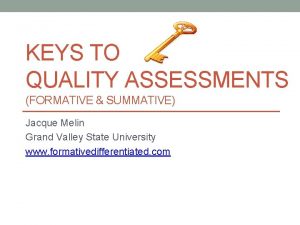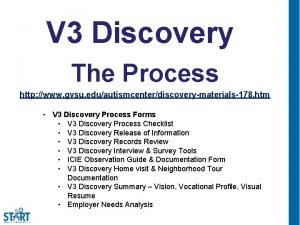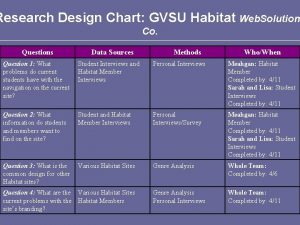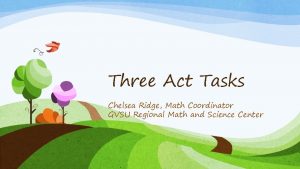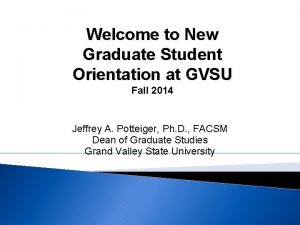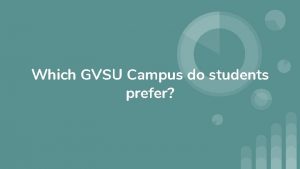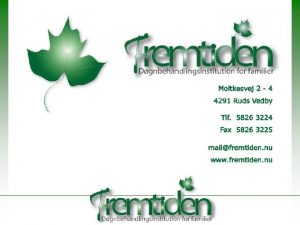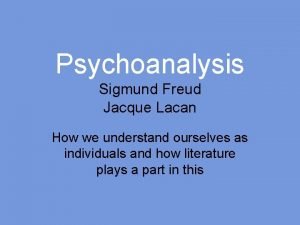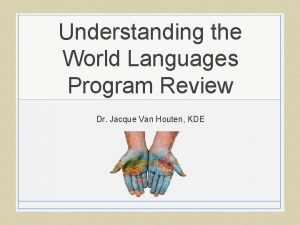Jacque Melin GVSU www formativedifferentiated com melinjgvsu edu



























































- Slides: 59

* Jacque Melin – GVSU www. formativedifferentiated. com melinj@gvsu. edu

*Anything about “informative assessment. ” *

Pocketmod. com

*By the end of this workshop, you should be able to say… *I can use routine formative assessments during my lessons everyday. *I can use reflective formative assessments during some of my lessons. *I can create student-involved rigorous formative and summative assessments.

* A quick review

* *Takes place WHILE the teaching/learning is happening; *Coaching students to hit a series of learning targets; *Making students partners in their learning; *Descriptive feedback and part of instruction; *Assessment FOR learning.


* “I can…” statements *Statements of intended learning. *Statements that describe how we will know that we have learned it. *Should be posted, not just shared verbally.




Christina Hank http: //turnonyourbrain. wordpress. com/



* *A judgment, usually communicated by a grade or score, about how well students achieve the final learning targets; *Evaluative feedback and after instruction; *Assessment OF learning.

Informative Assessment Name: Date: Place: From Fogarty & Pete – Wildly Exciting, 2010

Take Away Window:

Routine Assessments Everyday, All day

Routine Assessments Everyday, All day ü Think-Pair-Share ü Exit Cards ü Signaling

Unobtrusive Think-Pair-Share • Alphabet Graffiti • Card Trick • Dry Erase – Back-to. Back Boards • Onion Circle • On a Roll • Spinner * Exit Cards • Entrance/Exit Cards • Bump in the Road or Fogginess • Letter to Principal or Parents • Most Valuable Points • Quick Write/Quick Draw • Synectics • Twitter Post • Wall. Wisher – Web 2. 0 Signaling • Magnets/Post-Its • Windshield Check • Use of Technology


* A B C D E F G H I J K L M N O P Q R S T U V W X Y Z From Fogarty & Pete – Wildly Exciting, 2010

* *Each student picks a playing card. *When the teacher asks a question or gives a problem, discuss it with your partner. *The teacher will say something like, “all red cards stand” or “all Kings stand. ” *The teacher will pick someone who is standing to respond.

* *You and your partner each get a mini-white board and stand back-to-back. *The teacher asks a question and you each answer on your board. *When the teacher says “turn around” you show each other your answers and discuss.

*Outside/Inside Circle *Inside and outside circles of students face each other. *Within each pair of facing students, students quiz each other with questions they have written or problems they have created. *Outside circle moves to create new pairs. *Repeat.

* *Each table rolls a number cube *Students at the table answer the question that corresponds to the number rolled *Can be used for several days over the course of a topic of study

* 1. 2. 3. 4. 5. 6. Write a question someone should be able to answer after hearing this lesson. Explain the most important idea in the lesson in a way a first-grader could understand. Draw a picture that represents the main idea of the lesson. Tell which part you found to be the most confusing. If you were going to learn more about this topic, what would you choose to investigate. Write a headline for a newspaper article about today’s lesson.

* *In response to a teacher prompt or question, students THINK, *Then PAIR (discuss with a partner), *And then SHARE ideas with the whole class – only those whose number is called (using the spinner) share.

1 SPIN 2 8 3 7 4 6 5

1 SPIN 2 8 3 7 4 6 5

1 SPIN 2 8 3 7 4 6 5

1 SPIN 2 8 3 7 4 6 5

1 SPIN 2 8 3 7 4 6 5

1 SPIN 2 8 3 7 4 6 5

1 SPIN 2 8 3 7 4 6 5

1 SPIN 2 8 3 7 4 6 5

Unobtrusive Think-Pair-Share • Alphabet Graffiti • Card Trick • Dry Erase – Back-to. Back Boards • Onion Circle • On a Roll • Spinner * Exit Cards • Entrance/Exit Cards • Bump in the Road or Fogginess • Letter to Principal or Parents • Most Valuable Points • Quick Write/Quick Draw • Synectics • Twitter Post • Padlet – Web 2. 0 Signaling • Magnets/Post-Its • Windshield Check • Use of Technology


* *Name *Answer: Rate yourself: 1 = high confidence 2 = medium confidence 3 = I’m not sure on this YES Would you help someone else learn this? Not at this time

* *Write down something from the lesson that they find confusing or difficult. *Collect responses and review, OR *Form small groups and ask students to share their “bumps” and seek clarification.

* *Write a short letter to the principal/parent telling him or her all of the ideas you have learned about this week.

* *Students list *3 new ideas *2 connections *1 question *1 -sentence summary * Betsey Kennedy

3 Pointer (3 New Things You Learned) *____________________________________________ *______________________ 2 Pointer (2 Connections You Can Make) *____________________________________________ Foul Shot (What Question Do You Have? ) *______________________ * Betsey Kennedy

Quick Write/Quick Draw Science Sequence/steps/cycles/processes Scientific principles Content-area vocabulary Math Steps in a process Social Studies Important events/turning points/conflicts Elements of civilization Highlights of an era Content-area vocabulary ELA Character/key figures/attributes Setting/conflict/problems & solutions Beginning, middle, end Symbols/themes From 25 Quick Formative Assessments for a Differentiated Classroom

* *Teacher selects an important topic *Students list 4 unusual items (unrelated to topic) *Students create a relationship between the topic and each of the 4 items * Betsey Kennedy


a school because a car because A cell is like… a television because a book because * Betsey Kennedy

* *Can be used as a Ticket-Out-the-Door *Students summarize what they learned using no more than 140 characters F O R M A T S S M E N T E A C H E R S S T U D E N G T H S K N E S S E T T H E Y E D E C I A S O E U T I N I V E A S H E L P S T K N O W A T ‘ S S T R A N D W E A S O T H A C A N M A K S I O N S A B P P R O P R I A T T R U C T I O N . S S E FORMATIVE ASSESSMENT HELPS TEACHERS KNOW A STUDENT’S STRENGTHS AND WEAKNESSES SO THAT THEY CAN MAKE DECISIONS ABOUT APPROPRIATE INSTRUCTION. * Betsey Kennedy

* *http: //www. padlet. com

Unobtrusive Think-Pair-Share • Alphabet Graffiti • Card Trick • Dry Erase – Back-to. Back Boards • Onion Circle • On a Roll • Spinner * Exit Cards • Entrance/Exit Cards • Bump in the Road or Fogginess • Letter to Principal or Parents • Most Valuable Points • Quick Write/Quick Draw • Synectics • Twitter Post • Wall. Wisher – Web 2. 0 Signaling • Magnets/Post-Its • Windshield Check • Use of Technology



* No clue I’ve heard of this. I know a lot about this. I’m an expert on this.


* *Includes all types of questions *Doesn’t require individual student Google account *Minimal set up time

* *Instant feedback in seconds. *Use cell phone or any other device connected to the internet *Poll

* *Mobile studying!! *Digital flashcards and games. *Quizlet preview

* *Needs cell phone/internet capable device *m. socrative. com *Room # 7615

As a team of educators: Discuss with your peers the Routine strategies you intend to use.
 Cơm
Cơm Dậy thổi cơm mua thịt cá
Dậy thổi cơm mua thịt cá Jacque lacan
Jacque lacan Jacque carter
Jacque carter Poesie le cancre de jacque prevert
Poesie le cancre de jacque prevert Beatrice melin
Beatrice melin Karen melin fairbanks
Karen melin fairbanks Mariela quintana melin
Mariela quintana melin Gvsu people finder
Gvsu people finder Waration certificate
Waration certificate Navigate gvsu
Navigate gvsu Gvsu writing consultants
Gvsu writing consultants Pdp 2
Pdp 2 Ken217
Ken217 Gvsu radiation therapy
Gvsu radiation therapy Irb gvsu
Irb gvsu Edu.sharif.edu
Edu.sharif.edu Https://scratch.mit,edu/
Https://scratch.mit,edu/ Sheep eye dissection worksheet
Sheep eye dissection worksheet Global edge.msu.edu
Global edge.msu.edu Edu.manage
Edu.manage Uci ics account
Uci ics account Edu qua
Edu qua Www.bf.tku.edu.tw/files/news chapter 17
Www.bf.tku.edu.tw/files/news chapter 17 Lib umich edu
Lib umich edu Edu 301
Edu 301 Www.learn.genetics.utah.edu
Www.learn.genetics.utah.edu Myuhportal.hawaii.edu
Myuhportal.hawaii.edu Michelle sprouse
Michelle sprouse Jane majanen
Jane majanen Mesonet.agron.iastate.edu
Mesonet.agron.iastate.edu Mail.ustc.edu.n
Mail.ustc.edu.n Library.med.utah.edu/kw/pharm/hyper heart.html
Library.med.utah.edu/kw/pharm/hyper heart.html Mel.np
Mel.np Edu biz
Edu biz Oak ridge skyward
Oak ridge skyward Eduextension
Eduextension Wr-101
Wr-101 Ebs.msu.edu
Ebs.msu.edu Utmspace smp
Utmspace smp Sucharski edu
Sucharski edu Findlay escape room
Findlay escape room Lutherrice.edu blackboard
Lutherrice.edu blackboard Tecnoedu.com
Tecnoedu.com Mywcu login
Mywcu login Mgh.harvard.edu
Mgh.harvard.edu Moodle ticketing system
Moodle ticketing system Highwire stanford edu
Highwire stanford edu Moodle.lfu.edu.krd
Moodle.lfu.edu.krd Ksu.edu.ru
Ksu.edu.ru Assessform.edu.au naplan
Assessform.edu.au naplan Distro yıldız
Distro yıldız Webradier
Webradier Blackboard cornell
Blackboard cornell Edu lahti
Edu lahti Washington.edu
Washington.edu Uhhttps://accessuh.uh.edu/login.php
Uhhttps://accessuh.uh.edu/login.php Icas francolise
Icas francolise Edu
Edu Hit edu
Hit edu

